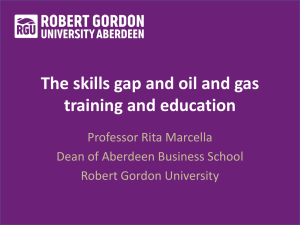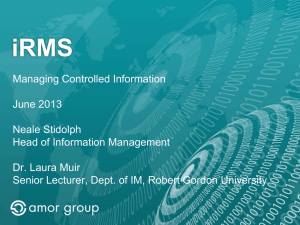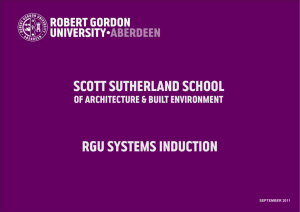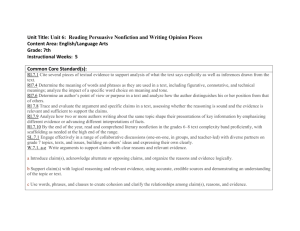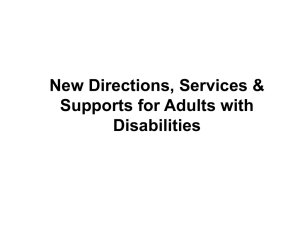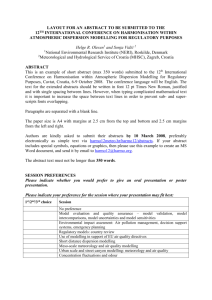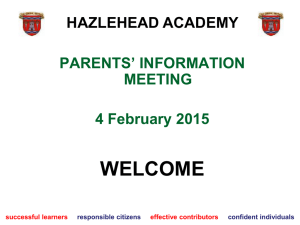Knowledge, skills and experience matrix of Robert Gordon for IBioIC
advertisement
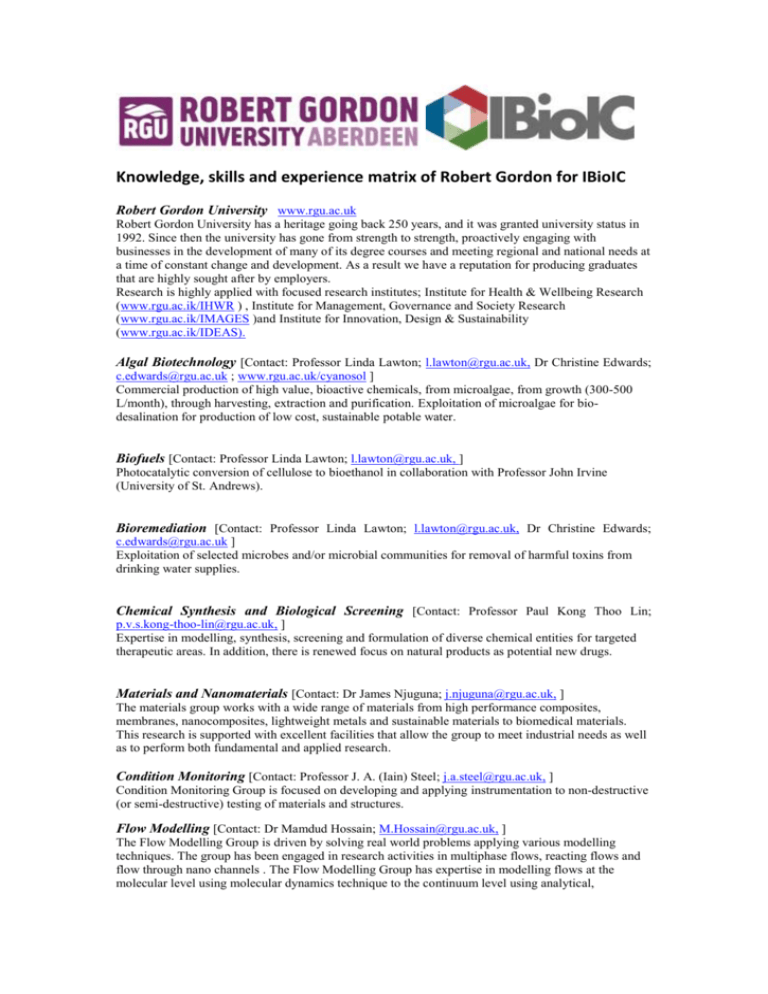
Knowledge, skills and experience matrix of Robert Gordon for IBioIC Robert Gordon University www.rgu.ac.uk Robert Gordon University has a heritage going back 250 years, and it was granted university status in 1992. Since then the university has gone from strength to strength, proactively engaging with businesses in the development of many of its degree courses and meeting regional and national needs at a time of constant change and development. As a result we have a reputation for producing graduates that are highly sought after by employers. Research is highly applied with focused research institutes; Institute for Health & Wellbeing Research (www.rgu.ac.ik/IHWR ) , Institute for Management, Governance and Society Research (www.rgu.ac.ik/IMAGES )and Institute for Innovation, Design & Sustainability (www.rgu.ac.ik/IDEAS). Algal Biotechnology [Contact: Professor Linda Lawton; l.lawton@rgu.ac.uk, Dr Christine Edwards; c.edwards@rgu.ac.uk ; www.rgu.ac.uk/cyanosol ] Commercial production of high value, bioactive chemicals, from microalgae, from growth (300-500 L/month), through harvesting, extraction and purification. Exploitation of microalgae for biodesalination for production of low cost, sustainable potable water. Biofuels [Contact: Professor Linda Lawton; l.lawton@rgu.ac.uk, ] Photocatalytic conversion of cellulose to bioethanol in collaboration with Professor John Irvine (University of St. Andrews). Bioremediation [Contact: Professor Linda Lawton; l.lawton@rgu.ac.uk, Dr Christine Edwards; c.edwards@rgu.ac.uk ] Exploitation of selected microbes and/or microbial communities for removal of harmful toxins from drinking water supplies. Chemical Synthesis and Biological Screening [Contact: Professor Paul Kong Thoo Lin; p.v.s.kong-thoo-lin@rgu.ac.uk, ] Expertise in modelling, synthesis, screening and formulation of diverse chemical entities for targeted therapeutic areas. In addition, there is renewed focus on natural products as potential new drugs. Materials and Nanomaterials [Contact: Dr James Njuguna; j.njuguna@rgu.ac.uk, ] The materials group works with a wide range of materials from high performance composites, membranes, nanocomposites, lightweight metals and sustainable materials to biomedical materials. This research is supported with excellent facilities that allow the group to meet industrial needs as well as to perform both fundamental and applied research. Condition Monitoring [Contact: Professor J. A. (Iain) Steel; j.a.steel@rgu.ac.uk, ] Condition Monitoring Group is focused on developing and applying instrumentation to non-destructive (or semi-destructive) testing of materials and structures. Flow Modelling [Contact: Dr Mamdud Hossain; M.Hossain@rgu.ac.uk, ] The Flow Modelling Group is driven by solving real world problems applying various modelling techniques. The group has been engaged in research activities in multiphase flows, reacting flows and flow through nano channels . The Flow Modelling Group has expertise in modelling flows at the molecular level using molecular dynamics technique to the continuum level using analytical, mechanistic and computational fluid dynamics techniques. The group is also equipped with multiphase flow loop, wind tunnel, PIV system for experimental measurements. Centre for Research in Energy and the Environment (CREE) [Contact: Professor Robertson; peter.robertson@rgu.ac.uk, www.rgu.ac.uk/cree] The Centre for Research in Energy and the Environment is a multidisciplinary group with applied research expertise in environmental monitoring, taggant development, labels and sensors, advanced water and air treatment technology, and environmental catalysis. Centre for Understanding Sustainable Practice (CUSP) [Contact: Dr Alan Owen; a.owen@rgu.ac.uk, www.rgu.ac.uk/CUSP ;] The Centre for Understanding Sustainable Practice (CUSP) works with organisations and communities at many levels to establish sustainable and resilient societies. CUSP staff work in many, often difficult, locations, from Aberdeen to Dili, always focussed on the interaction between people and technology in the context of social, environmental, political, and economic sustainability. We are accustomed to working at sea, in jungles and remote rural locations; whether it is with academics, business, individuals or the media. Our projects include: Resource feasibility studies, Appropriate technology (design, manufacture, installation, operation, maintenance), Teaching, training and professional development. Computational Intelligance [Contact: Dr Andrei Petrovski; a.petrovski@rgu.ac.uk ] The Computational Intelligence research group has a primary focus in the three related areas of evolutionary algorithms, data mining, probabilistic modelling, and parallel computing with applications in the oil and gas Industry, medical and biological Informatics and engineering/ logistics applications. Smart Information Systems [Contact: Dr David Corney; d.p.a.corney@rgu.ac.uk ] The SIS group develops innovative digital technologies for building and applying intelligent information systems for real-world problems. Socio-Technical Systems [Contact: Professor Ian Allison; i.allison@rgu.ac.uk ] The Socio-Technical Systems research group investigates the interactions between information technologies, design methods and people. The group researches both organisation-level software design, development and adoption methods as well as user-focussed design technologies such as user simulation through cognitive modelling, face recognition and modelling, location/situation-aware systems, visualisation and mobile technologies.
